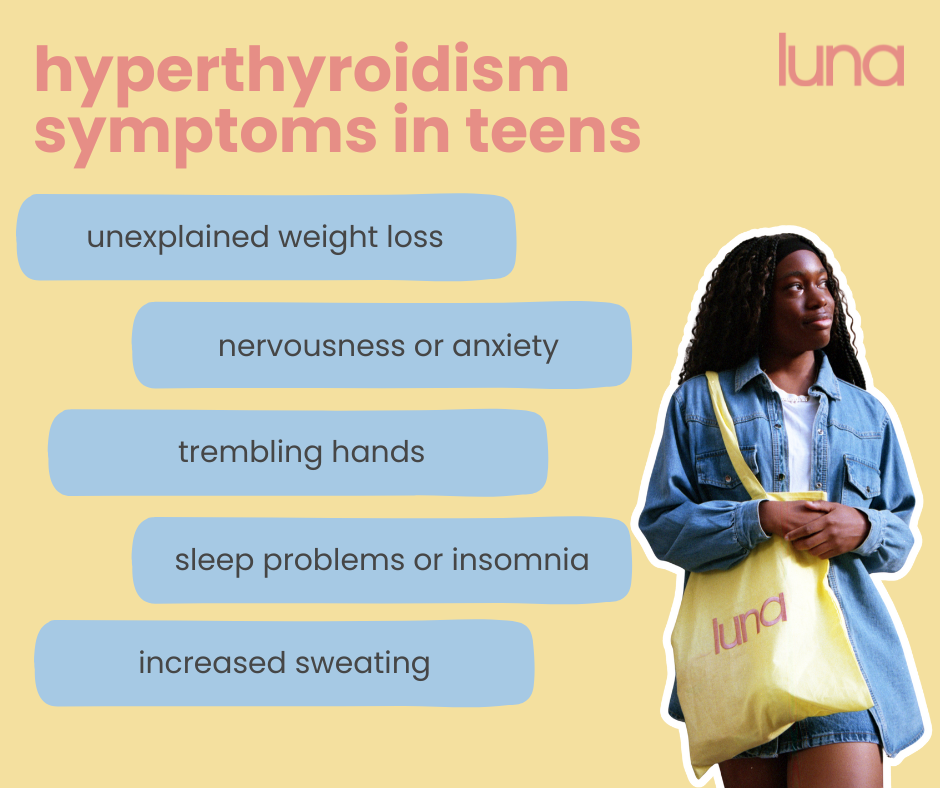Hyperthyroidism in teens: 19 signs to spot
Noticing the signs early

Updated November 20, 2025 • Medically reviewed by Dr. Emma Dickie
Medically reviewed by Dr. Emma DickieIn this article
- Quick summary
- What is hyperthyroidism in children?
- What is hyperthyroidism in teens?
- Thyroid symptoms in teenage girls
- 19 signs of thyroid problems every parent should know
- When parents should never overlook thyroid issues in teens
- Diagnosis and treatment options
- Supporting your child at home
- Facing hyperthyroidism together
Quick summary
- Hyperthyroidism happens when the thyroid gland produces too much thyroid hormone, speeding up your teen’s metabolism and affecting growth, mood, and energy
- Symptoms often mimic puberty or stress, but spotting changes early can prevent long-term health problems
- With diagnosis, treatment, and consistent support, teens with hyperthyroidism can lead healthy, balanced lives

If your teen has been unusually anxious, losing weight without trying, or struggling with sleep, you might chalk it up to stress or puberty.
But sometimes, these changes point to something deeper, like a thyroid problem.
The thyroid, a small butterfly-shaped gland in the neck, plays a big role in how the body grows, uses energy, and regulates mood.
When it produces too much of the thyroid hormones, it can send a teen’s metabolism into overdrive – a condition known as hyperthyroidism.
Because many of its symptoms overlap with normal teenage ups and downs, hyperthyroidism often goes unnoticed at first.
So, luna is here to help you recognise the signs and know what to do if you think your teen has hyperthyroidism.
What is hyperthyroidism in children?
Hyperthyroidism happens when the thyroid gland produces too much of thyroid hormone.
When these hormone levels rise too high, the body speeds up and uses more energy than it should, leading to symptoms like rapid heartbeat, nervousness, or weight loss.
It’s different from hypothyroidism, where the thyroid produces too little thyroid hormone and slows down metabolism, often causing tiredness or weight gain.
Common causes of hyperthyroidism in children:
- Graves’ disease: an autoimmune condition and the most common cause in kids and teens
- Thyroid nodules: lumps on the thyroid that may produce extra hormones
- Thyroiditis: inflammation of the thyroid gland, often due to infections or sometimes autoimmune conditions, which causes a temporary hyperthyroidism, usually lasting a few months
While childhood hyperthyroidism is relatively rare, it’s important to catch it early. Untreated, it can affect growth, mood, and even heart health.
What is hyperthyroidism in teens?
In teenagers, hyperthyroidism can easily be mistaken for “just teenage behaviour.”
Mood swings, growth spurts, and changes in sleep or appetite often come with puberty, but they can also signal an overactive thyroid.
Teens with hyperthyroidism might:
- Feel anxious, restless, or unusually irritable
- Have trouble concentrating or remembering things
- Experience sudden dips in school performance
- Struggle to fall asleep, even when tired
Because thyroid hormones affect brain chemistry, these changes can influence how a teen feels, thinks, and connects with others.
You might notice your teen seems “wired,” easily frustrated, or emotionally overwhelmed, not unlike symptoms of anxiety or stress.

Thyroid symptoms in teenage girls
Girls are more likely than boys to develop thyroid conditions.
Physical signs to look out for:
- Unexplained weight loss despite eating well
- Hair thinning or shedding
- Rapid heartbeat or palpitations
- Trembling hands or fingers
- Sweating more than usual or feeling too warm all the time
Thyroid hormones influence reproductive health, so teens might experience irregular periods or even missed cycles.
Parents may overlook subtle emotional shifts such as restlessness and irritability
If these changes persist or seem “out of character,” it’s worth discussing them with your child’s doctor.
19 signs of thyroid problems every parent should know
Hyperthyroidism can show up differently from one child to another, but these are 19 key signs to be aware of:
- Unexplained weight loss: your child may lose weight despite eating normally or even more than usual
- Rapid heartbeat or palpitations: they might notice their heart racing, even at rest
- Nervousness or anxiety: they may seem constantly “on edge” or easily overwhelmed
- Trembling hands: subtle shaking or jitteriness, especially when holding objects, is common
- Sleep problems or insomnia: trouble falling or staying asleep due to an overactive metabolism
- Increased sweating: your child may sweat excessively, even when it’s cool
- Heat intolerance: they might complain that rooms feel too warm or seek out cool spaces
- Frequent bowel movements: more trips to the bathroom than usual, sometimes with mild stomach upset
- Fatigue or muscle weakness: despite high energy moments, muscles may tire quickly
- Hair thinning: hair may shed more than usual or appear fine and brittle
- Puffy or bulging eyes: especially with Graves’ disease, eyes may appear swollen or prominent
- Swollen neck (goitre): you might notice a visible lump or fullness in the front of the neck
- Menstrual irregularities: periods may become lighter, less frequent, or disappear temporarily
- Sudden changes in appetite: eating much more or much less than usual without explanation
- Mood swings or irritability: emotions may shift more quickly
- Trouble concentrating: difficulty focusing on homework, reading, or conversations
- Stunted growth or early puberty signs: thyroid imbalance can affect normal growth patterns
- Restlessness or hyperactivity: constant movement, fidgeting, or trouble sitting still
- Drop in school performance: grades or attention in class may decline due to fatigue and distraction
If you’re noticing several of these signs together, especially weight loss, rapid heartbeat, or neck swelling, it’s best to consult your child’s doctor for further assessment.
When parents should never overlook thyroid issues in teens
Untreated hyperthyroidism can affect nearly every part of a teen’s development. Over time, it can cause:
- Heart problems (like irregular rhythm or high blood pressure)
- Growth delays or weakened bones
- Emotional challenges such as anxiety, panic attacks, or depression
If you suspect something’s off, trust your instincts.
Early detection allows for easier treatment and fewer long-term complications.
The goal isn’t to scare you or your child here of course, but rather to empower you to notice subtle patterns that could mean your child needs a check in.
Diagnosis and treatment options
If your doctor thinks your child may have hyperthyroidism, they will often suggest a thyroid function test to check hormone levels.
This blood test measures the thyroid hormones T3 and T4, and TSH (thyroid-stimulating hormone (TSH)), a hormone from the brain which controls normal thyroid function.
If your child’s thyroid levels are found to be high, they will often be referred to a specialist for further tests.
These might include:
- More detailed blood tests, such as antibody tests to identify autoimmune causes like Graves’ disease
- Ultrasound scans to check thyroid size and look for nodules
Depending on the cause of hyperthyroidism, a specialist might recommend a range of treatment options including:
- Antithyroid medications to reduce thyroid hormone production
- Radioiodine therapy damages the thyroid gland so that it can’t make too much thyroid hormone
- Surgery may be required to remove all or part of the thyroid rare or resistant cases
Your child will often need regular follow-up appointments and monitoring to make sure hormone levels remain stable, ensuring healthy growth and development.
Supporting your child at home
Parenting through a hyperthyroidism diagnosis can feel daunting at first, but small daily actions make a big difference:
- Emotional support: listen to your child’s feelings – fatigue or mood changes can be frustrating for them, too
- Stress management: encourage calming activities like reading, journaling, or short walks
Remind your teen also that having a thyroid condition doesn’t define them, it’s something to manage, not something to be ashamed of.
Facing hyperthyroidism together
Hyperthyroidism in children and teens is treatable, especially when caught early.
If you notice unexplained physical, emotional, or academic changes, it’s worth checking in with your doctor.
Being observant and proactive doesn’t mean worrying over every symptom – it means giving your child the best chance to feel healthy, confident, and supported as they grow.
How we created this article:
luna's team of experts comprises GPs, Dermatologists, Safeguarding Leads and Junior Doctors as well as Medical Students with specialised interests in paediatric care, mental health and gynaecology. All articles are created by experts, and reviewed by a member of luna's senior review team.
Sources:
NHS "Overactive thyroid (hyperthyroidism)" | Accessed 30.10.25
https://www.nhs.uk/conditions/overactive-thyroid-hyperthyroidism/American Thyroid Association "Hyperthyroidism in children and adolescents" | Accessed 30.10.25
https://www.thyroid.org/hyperthyroidism-children-adolescents/Kids Health "Hyperthyroidism and graves’ disease" | Accessed 30.10.25
https://kidshealth.org/en/parents/hyperthyroidism.htmlWe'd love to keep in touch!
Sign up to our parent newsletter for emails on the latest teen trends, insights into our luna community and to keep up to date
By signing up, you are agreeing that we can use your email address to market to you. You can unsubscribe from marketing emails at any time by using the link in our emails. For more information, please review our privacy statement.